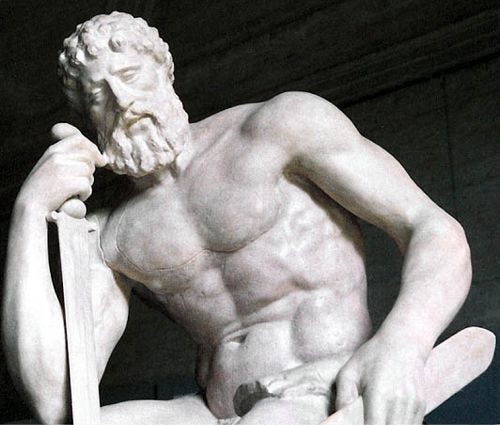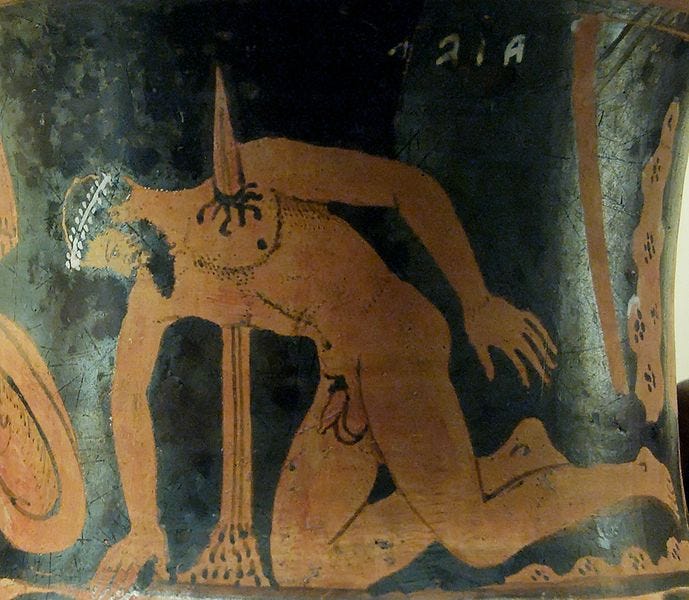The Tragedy of Ajax
Greece's Second Greatest Soldier?
Dear Classical Wisdom Reader,
One of the things that’s most striking about the literature of ancient Greece is the sheer humanity of it.
For a world populated by all manner of gods, heroes, and monsters, the Greeks never lose sight of the ache of the human heart… or its grievances.
Today’s article looks at the mythical character of Ajax. Although he was known as “Ajax the Greater” (distinguishing him from “Ajax the Lesser”, the leader of the Locrians), Ajax was famed as the Greeks’ second greatest warrior at Troy, next only to Achilles.
Much like Achilles himself, Ajax is shown a great dishonor, setting the stage for one of Greek tragedy’s most powerful tales.
Discover how the great playwright Sophocles drew upon this Homeric figure, and despite the darkness of the story, was able to find hopefulness within it, as a bitter enemy comes to respect his adversary.
It’s a fitting tale for Memorial Day Weekend. And it’s not the only way we’re marking the occasion…
This Memorial Day Weekend, we are having a special SALE.
You can get our stunning hard back anthology of the greatest writers and thinkers of antiquity The Essential Classics at the massive discount price of $49 (plus a small shipping fee), instead of the usual $249.
Featuring writings by Plato, Aristotle, Sophocles, Euripides, Marcus Aurelius and more, The Essential Classics really is the “best of the best” of the ancient world.
This offer is for this weekend ONLY!
Don’t miss out… Check it out HERE.
All the best,
Sean Kelly
Managing Editor
Classical Wisdom
The Tragedy of Ajax
by Ben Potter
Aias to the Greeks, Aiax to the Romans, now known to us as the anglicized Ajax, he was ‘the best of all men that ever came to Troy, save only Achilles’.
However, Ajax’s status as number two in the Greek pecking order wasn’t always fully appreciated. After Achilles perished when the arrow fired by the Trojan prince Paris pierced his Achilles’ heel (oh the irony!) and Ajax gallantly carried his fallen comrade from the battlefield, it was assumed that the coveted armor worn by the slain hero would pass on to the number two warrior, Ajax.
However, the Greek commander Agamemnon and his brother, husband of the wanton Helen, Menelaus had other ideas. Persuaded by his eloquence, they decided to give the armor to Odysseus.
So what’s the big deal? Ajax is a wealthy prince and a mighty warrior, surely he doesn’t need Achilles’ armor, right?
Wrong.
The armor is not merely precious, useful and a wonderful souvenir which could rival a piece of the true cross, but it is hugely symbolic. It is so saturated in symbolic honor that to be denied it, Ajax has been forced to suffer a de facto demotion.
This snub is enough to tip a character, who is often portrayed as tactless, boorish and arrogant, totally over the edge.
He resolved to steal out into the night and enter the beach encampments of his fellow Greek commanders whereupon he would kill whomever he could and bring the rest back to his own tent for torture.
This, Ajax achieved… or at least thought he had achieved. Instead the goddess Athena, looking to protect her favorite, Odysseus, sent Ajax mad so that instead of mutilating Agamemnon, Menelaus et al, he butchered a flock of sheep.
It is at this point, with sanity suddenly returning to him, that Sophocles‘ Ajax begins.
However, an Athenian audience wouldn’t have been waiting with bated breath to see what was in store for the man whose stock has dropped from the heights of second greatest of all the Greeks to being a traitor and maniacal livestock botherer. They already knew his fate; he was to commit suicide.
Whilst myths are able to evolve and Athenian tragedians do often significantly change major details of stories, this one was perhaps a step too far even for the innovative Sophocles to tinker with.
Instead what he does is develop Ajax’s tragic flaw. Quite obviously pride would be the one to play up, but Sophocles mixes it with a shot of blasphemy to make a cocktail of hubris.
There is some minor evidence for such impiety in the Iliad. In book XI, Ajax won’t listen to the gods when they instruct the Greeks to retreat from the battlefield, but continues fighting nobly and bravely when the other heroes are making their tactical withdrawal.
Also, most Greek heroes are honored by a patron deity who watches over them. Odysseus and Diomedes have Athena, Achilles has Thetis; even the Trojans Paris and Hector have Aphrodite and Apollo respectively. However, Ajax is alone.
It is this theme that Sophocles nurtures as we learn that Athena did not merely send Ajax wild to save her dear Odysseus, but to punish the doomed man himself. The Messenger (a stock character in ancient tragedy) highlights just why this is:
“The gods have dreadful penalties in store for worthless and redundant creatures, mortals who break the bounds of mortal modesty. And Ajax showed he had no self-control the day he left his home. ‘Son,’ said his father – and very properly – ‘Go out to win, but with God beside you.’ ‘Oh,’ said Ajax with vain bravado, ‘any fool can win with God beside him; I intend to win glory and honor on my own account.’”
Thus Ajax is seen not only as a character with a deeply flawed personality, but one who is on the end of Divine retribution. So the question that crops up isn’t so much ‘did he deserve his fate’ as ‘can we feel any sympathy for him at all’?
Well… Ajax was honor-bound to come to Troy by the oath sworn during his courtship of Helen. In Sophocles, Ajax is less concerned with rescuing the stolen princess than with trying to please or even emulate his father Telamon, who himself sacked Troy in the previous generation along with Heracles – a feat, of course, which Ajax has been unable to better.
Telamon, “the man who never smiles”, is the only man who Ajax seems afraid of and indeed he comments timorously: “How will he welcome me, when I come home empty-handed?”
It feels like Ajax been pushed all his life to try and accumulate kleos (reputation) and succeed at every turn simply in order to be able to step out of his father’s shadow. The failure to gain Achilles’ armor would have be seen as unacceptable in Ajax’s own eyes and presumably also in those of Telamon.
Can we find sympathy for a man whose every waking thought is centered round yearning for his father’s approval? Is this something which reinforces Ajax’s pathetic vanity? And in turn does it cause us to pity rather than despise him?
Sophocles includes a “family scene” which contrasts starkly to its inspiration in book VI of the Iliad. It involved Hector, his wife, Andromache and their son, Astyanax. Hector, knowing he was going into mortal combat from which he may not return, is depicted as a loving husband and gentle father.
The parody in Ajax shows the ‘hero’, not going nobly into battle, but about to selfishly and capriciously commit suicide. In these final moments they can share together he is very curt and snaps at his wife, Tecmessa. He hopes that his son, Eurysaces, will be as good a man as he is, only more lucky. Hector on the other hand desired that Astyanax would emulate him, going on to bigger and better things. This makes it seem like Ajax can’t bear to be outshone by anyone, not even his own flesh and blood!
Both men also worry about their wives being sold into slavery should they die. However, by committing suicide and Tecmessa being a foreigner, Ajax has all but guaranteed this fate for her.
The dramatic irony of this scene causes us to feel great pity for poor Tecmessa, an innocent victim of a self-destructive and proud fool who, instead of being the linchpin of victory in the Trojan War heaps woe upon woe, tarnishes his reputation, enslaves his loved-ones, bereaves his loyal and loving half-brother and leaves his father without an heir.
However, this is not the only way in which Sophocles creates suspense, pity and fear. Ajax falls on his sword just over half way through the story, the rest of the play is a struggle between Ajax’s half-brother, Teucer and the opposing, gloating siblings, the sons of Atreus, Agamemnon and Menelaus.
The tension comes about because Teucer is being denied by the Atreidai (the sons of Atreus) the right to bury Ajax.
Prohibition of burial rites might seem like more of an insult than a real tragedy to us, but it was of vital importance to the Greeks. It was not a matter of life and death, it was much more important than that!
Indeed, the importance of burial rites ties in with the fact that Sophocles has been, very wrongly, accused of making a hash out of Ajax due to the fact that the main character dies, and therefore the climax is reached, so early in the performance.
What these critics don’t understand is that the death is a foregone conclusion, common knowledge to all, but the burial of Ajax is far from guaranteed. Consequently, this sacred rite, the blasphemous denial of which would leave no Athenian theatre-goer sitting comfortably, creates tension and drama of the very highest order. Especially as all the men at the crux of the debate are edgy, angry and highly dangerous.
Indeed some interpret the play as reflecting the mental pressure on men in the appalling conditions of siege-warfare, far away from their homes and loved-ones and with the constant threat of slavery or annihilation hanging over their heads.
However, the play ends on a hopeful note thanks to a most unlikely source.
Odysseus, acting like a deus ex machina, manages to convince Agamemnon that Ajax, despite his faults, deserves a burial. Although Agamemnon doesn’t really concur and is amazed that Odysseus, mortal enemy of Ajax, wants to help Teucer, he allows him to do as he pleases.
And these are the words with which Odysseus guides the heart-broken Teucer through his darkest hour:
“I have this to say to you: I am your friend henceforth, as truly I was your enemy; and I am ready to help you bury your dead and share in every office that we mortals owe to the noblest of our kind”.
And thus Odysseus shows us that even in death, even through enmity, even when blood has been shed, bile been spat, even when hate and hostility trickle from the lips more readily than any words of friendship or conciliation…. even then there is still room for someone to step in and make things right, to honor the gods through a kind act and to lighten, even slightly, the weight upon a bereaved and dejected soul.







Very good article. Hubris and vanity gets them every time.
A great retelling. Odysseus came up good.